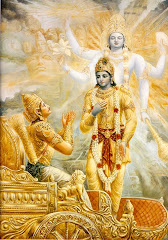
Author's note: Do read the 1st part of this post here.
This is the 2nd part of the same post that I discovered while trawling the net... and decided to share it on my blog... so that all my readers can be entertained as well :)
After the Tehmuri dynasty was over the throne of unified India was once again empty, and since somebody had to be king it was decided by mutual consent to let Babur, an unemployed regent at the time, take the seat of power. Babur had lost his own kingdom in Samarkand you see, and since Samarkand was a pretty big place, he didn't want to go looking for it.
Besides, Babur was obligated by history to fight in the battle of Panipat and found the Mughul Sultanate. If he hadn't come to the sub-continent, the battle of Panipat would've been rather one sided, given that only Ibrahim Lodhi would have turned up for it, who himself might have been convinced to stay home learning of Babur's lack of interest. Then nobody would have turned up for it. That would have been very embarrassing for historians.
To become the unequivocal ruler of Hindustan, Babur also had to deal with the Rajputs. He had to defeat Rana Sanga, Ranatunga and other members of the Sri Lankan cricket team to consolidate his authority.
Babur was reputedly an extremely strong man who used to climb the stairs to his palace with a couple of men on his shoulders. This, he said, was for exercise although there are rumours that he provided this service for some much needed disposable income. It was tough being a ruler in those days, the salary was very little and opportunities for kickbacks and appropriations so few. There were no Swiss banks to embezzle the national treasury into, either.
Babur was succeeded by his son Humayun, who had spent years coining the royal title Al-Sultan al-'Azam wal Khaqan al-Mukarram, Jam-i-Sultanat-i-haqiqi wa Majazi, Sayyid al-Salatin, Abu'l Muzaffar Nasir ud-din Muhammad Humayun Padshah Ghazi, Zillu'llah for himself. He really should have done something better with his time, because no sooner had he ascended to power that someone with a much shorter name and much more experience in warfare defeated him and took his throne.
Humayun, like any blue-blooded emperor in his position, did the brave thing and fled to Persia. Since Sher Shah Suri was much older than the young Mughul ruler, Humayun's strategy was now to wait for the Pashtun lord to die first, an eventuality that occurred in the summer of 1545. Nine years later, Sher Shah's son followed suit.
Emboldened by the natural demise of his enemies, the ambitious Humayun marched back into India with his eyes towards the heavens, and fell down numerous times for not looking where he was going. After many wrong turns and much bickering with his generals, he finally reached Delhi in 1555 to lay down on his father's throne, as he was far too tired to sit.
Humayun's death proved to be as comical as his life, as in early 1556 he fell down the library stairs after getting his robe caught under his foot, injuring himself badly. Or injuring himself very well, rather, because he died just three days afterwards. This should serve to highlight the danger posed to health by reading too many books.
It is also worth repeating that India was at one time ruled by a man who tripped himself down the stairs to his own death. This should be kept in mind when furiously contemplating how a company of traders and merchants from Britain managed to take down an entire empire in a matter of years. They just built their offices on the second floor.
Humayun left his throne to his thirteen year old son, Akbar, who proved to be an astute monarch. He gave the sub-continent a thorough system of taxation, printed his own currency and gave the media and judiciary all the independence that could reasonably be expected from an unelected monarch which, it goes without saying, pales in comparison to the freedom granted by today’s elected monarchs.
During his regime, the prices of utilities and food items were very low, at least much lower than they are today. Poor people could afford sugar and petrol, they didn't have to ration their tea, they weren't forced to sell their internal organs just to pay the electricity bills and all in all it was a time of greatly relative prosperity.
Akbar-e-Azam was a religious pluralist who had no delusions of self-grandeur. Those rumours were base and false. His Majesty Imam-i-'Adil, Amir-ul-Mu’minin, Sultan ul-Islam Kafatt ul-Anam did not start his own religion for self-deification. Din-i-Ilahi was a self-less venture intended to strengthen the communal bondage between the various religious communities of India and his undisputed throne.
But Akbar (played wonderfully by Prithviraj Kapoor) having conquered all the external threats to his power would find trouble much closer to home. His eccentric son Salim (Dilip Kumar) would become smitten by one of the courtly concubines, Anarkali (Madhubala) while his wife, Jodha Bai (Durga Khote), would largely be a spectator as Bahar (Nigar Sultana) exposed the affair in an open court. Akbar would sentence Anarkali to be buried alive as the pleas of her mother (Jilloo Bai) would fall on ears not quite deaf but definitely hard of hearing.
Critics agree that the character of Mann Singh (played by Murad) was largely inconsequential to the proceedings but Anarkali's classical rendition of 'Pyar Kiya to Darna Kya' received great plaudits and would inspire the latter day Lata Mangeshkar hit.
In Part 3: Dilip Kumar's revenge and ascension to the Mughal throne as Jahangir.
Meanwhile, more practice questions:
"Have you ever fallen to your death down any stairs?"
"Why not?"
A point to ponder: Why did Asia stagnate despite being ahead of Europe earlier? Just before Europe's take-off, Central Asian nomads, who reveled particularly in destroying formal knowledge, attacked Baghdad, India and China. One of Ancient India's seats of learning, the Nalanda University burned for 3 months after Khilji's attack while Mongols piled the books in Baghdad's House of Wisdom to cross the Tigris. Without such attacks, some Asian intellectual centers too may have soon then sparked Europe-like societal changes. While Europe suffered warfare too, its intellectual repositories survived them.
Note: For further readings:
1. The Legacy of Muslim Rule in India.
2. The Convenient Omissions From Islamic History.
3. Why the West? Race, Religion, Culture and Development.
4. On Raja Paurava and Alexander.
Photograph: A still from the movie 'Mughal-e-Azam'... with Prithviraj Kapoor as the Emperor Akbar and Dilip Kumar (Yusuf Khan) as Prince Salim (later Emperor Jahangir). Pic courtesy: link.












funny , I truly missed in part 1 that this was satire .
ReplyDeleteHe has wits and regarding (THIS) history I would quote GBS who said
"Hegel was right when he said that we learn from history that man can never learn anything from history."
One of my favorite quotes to which my friends from humanities generally take offense. Pun indented [:)]
@ Sunilji: Yes, the chap sure has wit. Hope you went through the other links too. They provide some insights which in turn give some food for thought.
ReplyDelete... GBS could make some incising statements camouflaged in satire or humour just like Mark Twain.
... And that is the very reason history repeats itself :)